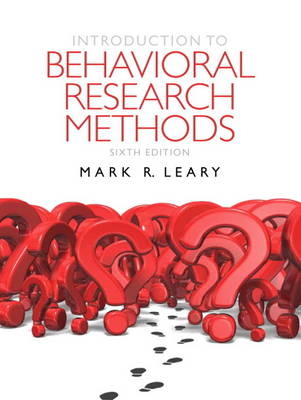
Introduction to Behavioral Research Methods
Pearson (Verlag)
978-0-205-20398-7 (ISBN)
- Titel erscheint in neuer Auflage
- Artikel merken
The author presents the material with sufficient elaboration, explanation, and examples that not only interest the student, but make it understandable.
Introduction to Behavioral Research Methods incorporates the four basic approaches to behavioral research (descriptive research, correlational research, experimental research, and quasi-experimental research), and shows students how to conceptualize questions, measure variables, design studies, and analyze data. Chapters on research ethics and scientific writing (including the most recent version of APA style) round out the book. Throughout each chapter, boxes on "Developing Your Research Skills" and "Behavioral Research Case Study" provide practical examples and pique student interest.
Teaching & Learning Experience
Personalize Learning - MySearchLab delivers proven results in helping students succeed, provides engaging experiences that personalize learning, and comes from a trusted partner with educational expertise and a deep commitment to helping students and instructors achieve their goals.
Improve Critical Thinking - New up-to-date Behavioral Research Case Studies help students apply research to practice.
Engage Students - The text is designed to make research methods understandable, useful, and interesting for students.
Explore Research - Real research, tidbits about the lives of famous researchers, and intriguing controversies that have arisen in behavioral science are included. A lab manual in MySearchLab helps engage students in the research process.
Support Instructors - MyTest, PowerPoints, and an instructor's manual offer additional support for instructors.
Note: MySearchLab with eText does not come automatically packaged with this text. To purchase MySearchLab with eText, please visit: www.mysearchlab.com or you can purchase a valuepack of the text + MySearchLab with eText (at no additional cost). VP: 0205196284 / 9780205196289
Mark R. Leary, Ph. D., Professor of Psychology and Neuroscience at Duke University, received his B.A. from West Virginia Wesleyan College (1976) and his doctorate from the University of Florida (1980). He taught at Denison University, the University of Texas at Austin, and Wake Forest University before moving to Duke. Dr. Leary's research and writing focus on social motivation and emotion, areas in which he has published more than 150 scholarly articles and chapters. Dr. Leary is a Fellow of the American Psychological Association, the Society for Personality and Social Psychology, and the Association for Psychological Science, as well as a member of the International Association for Relationship Research and the International Society for Self and Identity. Dr. Leary was the founding editor of Self and Identity, a new scholarly journal, and served for nine years as Associate Editor of the Journal of Social and Clinical Psychology. He has also served on the editorial review boards of the Journal of Personality and Social Psychology, Journal of Personality, Personality and Social Psychology Bulletin, Personality and Social Psychology Review, and Emotion.
IN THIS SECTION:
1.) BRIEF
2.) COMPREHENSIVE
BRIEF TABLE OF CONTENTS:
Chapter 1: Research in the Behavioral Sciences
Chapter 2: Behavioral Variability and Research
Chapter 3: The Measurement of Behavior
Chapter 4: Approaches to Psychological Measurement
Chapter 5: Selecting Research Participants
Chapter 6: Descriptive Research
Chapter 7: Correlational Research
Chapter 8: Advanced Correlational Strategies
Chapter 9: Basic Issues in Experimental Research
Chapter 10: Experimental Design
Chapter 11: Analyzing Experimental Data
Chapter 12: Analyzing Complex Designs
Chapter 13: Quasi-Experimental Designs
Chapter 14: Single-Case Research
Chapter 15: Ethical Issues in Behavioral Research
Chapter 16: Scientific Writing
COMPREHENSIVE TABLE OF CONTENTS:
Chapter 1: Research in the Behavioral Sciences
The Beginnings of Behavioral Research
Goals of Behavioral Research
Behavioral Science and Common Sense
The Value of Research to the Student
The Scientific Approach
Science and Pseudoscience
The Scientist's Two Jobs: Detecting and Explaining Phenomena
Research Hypotheses
Conceptual and Operational Definitions
Proof, Disproof, and Scientific Progress
Strategies of Behavioral Research
Domains of Behavioral Science
Behavioral Research on Human and Nonhuman Animals
A Preview
Summary
Chapter 2: Behavioral Variability and Research
Variability and the Research Process
Variance: An Index of Variability
Systematic and Error Variance
Assessing the Strength of Relationships
Effect Size: Assessing the Strength of Relationships
Meta-Analysis: Systematic Variance across Studies
The Quest for Systematic Variance
Summary
Chapter 3: The Measurement of Behavior
Types of Measures
Scales of Measurement
Assessing the Reliability of a Measure
Assessing the Validity of a Measure
Fairness and Bias in Measurement
Summary
Chapter 4: Approaches to Psychological Measurement
Observational Approaches
Physiological and Neuroscience Approaches
Self-Report Approaches: Questionnaires and Interviews
Archival Data
Content Analysis
Summary
Chapter 5: Selecting Research Participants
A Common Misconception
Probability Samples
Nonprobability Samples
How Many Participants?
Summary
Chapter 6: Descriptive Research
Types of Descriptive Research
Describing and Presenting Data
Frequency Distributions
Measures of Central Tendency
Measures of Variability Tendency
The z-Score
Summary
Chapter 7: Correlational Research
The Correlation Coefficient
A Graphic Representation of Correlations
The Coefficient of Determination
Statistical Significance of r
Factors That Distort Correlation Coefficients
Correlation and Causality
Partial Correlation
Other Indices of Correlation
Summary
Chapter 8: Advanced Correlational Strategies
Predicting Behavior: Regression Strategies
Assessing Directionality: Cross-Lagged and Structural Equations Analysis
Analyzing Nested Data: Multilevel Modeling
Uncovering Underlying Dimensions: Factor Analysis
Summary
Chapter 9: Basic Issues in Experimental Research
Manipulating the Independent Variable
Assigning Participants to Conditions
Experimental Control
Eliminating Confounds
Error Variance
Experimental Control and Generalizability: The Experimenter's Dilemma
Web-Based Experimental Research
Summary
Chapter 10: Experimental Design
One-Way Designs
Factorial Designs
Main Effects and Interactions
Combining Independent and Participant Variables
Summary
Chapter 11: Analyzing Experimental Data
An Intuitive Approach to Analysis
Hypothesis Testing
Analysis of Two-Group Experiments: The t-Test
Analyses of Matched-Subjects and Within-Subjects Designs
Computer Analyses
Summary
Chapter 12: Analyzing Complex Designs
The Problem: Conducting Multiple Tests Inflates Type I Error
The Rationale behind ANOVA
How ANOVA Works
Follow-Up Tests
Between-Subjects and Within-Subjects ANOVAs
Multivariate Analysis of Variance
Experimental and Nonexperimental Uses of Inferential Statistics
Summary
Chapter 13: Quasi-Experimental Designs
Pretest-Posttest Designs
Time Series Designs
Comparative Time Series Design
Longitudinal Designs
Cross-sequential Cohort Designs
Program Evaluation
Evaluating Quasi-Experimental Designs
Summary
Chapter 14: Single-Case Research
Single-Case Experimental Designs
Case Study Research
Summary
Chapter 15: Ethical Issues in Behavioral Research
Approaches to Ethical Decisions
Basic Ethical Guidelines
The Principle of Informed Consent
Invasion of Privacy
Coercion to Participate
Physical and Mental Stress
Deception
Confidentiality
Debriefing
Common Courtesy
Vulnerable Populations
Ethical Principles in Research with Nonhuman Animals
Scientific Misconduct
Suppression of Scientific Inquiry and Research Findings
A Final Note
Summary
Chapter 16: Scientific Writing
How Scientific Findings Are Disseminated
Elements of Good Scientific Writing
Avoiding Biased Language
Parts of a Manuscript
Citing and Referencing Previous Research
Other Aspects of APA Style
Writing a Research Proposal
Using PsycINFO
Sample Manuscript
| Erscheint lt. Verlag | 16.8.2011 |
|---|---|
| Sprache | englisch |
| Maße | 10 x 10 mm |
| Gewicht | 930 g |
| Themenwelt | Schulbuch / Wörterbuch |
| Geisteswissenschaften ► Psychologie | |
| Sozialwissenschaften ► Soziologie | |
| ISBN-10 | 0-205-20398-1 / 0205203981 |
| ISBN-13 | 978-0-205-20398-7 / 9780205203987 |
| Zustand | Neuware |
| Haben Sie eine Frage zum Produkt? |
aus dem Bereich



